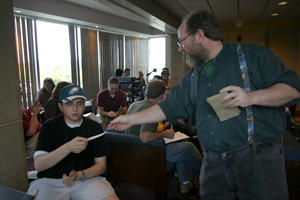10/10/2005
Professors Encourage Students To Play Games

jamie siegel/the ithacan
Video game designer Ernest Adams hands sophomore Nate Burba an idea. During workshops Wednesday, students created components that would turn the idea into a game.
By Aaron Munzer / staff Writer
October 06, 2005
Students in a new communications class to be offered next semester won’t play games to avoid doing homework — the games will be the homework.
Serious Gaming, a new course in the Roy H. Park School of Communications, will focus on teaching students how to create electronic games and interactive simulations that help people learn.
“Faculty here recognize that we should be preparing students for this,” said Dennis Charsky, assistant professor of organizational communication, learning and design. “It’s a growing and interesting aspect of the broader field of instructional design technology.”
The class is the latest step in an ongoing plan to integrate cutting- edge technological concepts like gaming into the Park School curriculum, said Dianne Lynch, dean of the Park School. This semester, a video game design class was the first to incorporate gaming into the curriculum. In this class, Ithaca College students collaborate with Cornell University students to create a video game from start to finish. The Cornell students are programming, and the Ithaca students are in charge of the design, storyboards and artwork.
Yesterday, the Park School and Cornell University hosted Ernest Adams, a gaming designer who has written several books about the video game industry.
Adams gave a public lecture at Cornell in Upson Hall on the future of computer entertainment and ran a game design workshop in Park 220, in which groups of students were given unconventional game ideas including managing a global media corporation and fighting forest fires. The students then discussed potential game play and core components that would be included in their hypothetical game.
Adams said serious gaming has a lot of potential.
“The video game industry hasn’t even begun to scratch the surface,” he said. “[Serious gaming] presents some interesting challenges because the goal is no longer just entertaining, yet the game still has to be fun.”
Lynch said Adams’ visit was an attempt to expose students to the changing paradigm of the video game world.
“One of the reasons we’re bringing Ernest Adams to campus is that he’s not just a guy who plays video games. He’s a cultural theorist,” Lynch said. “We’re trying to expose students to what’s really going on in the gaming industry. It’s a shift in thinking.”
Charsky said using video games to educate and teach is not a new idea but is becoming more popular as current technology becomes more capable of supporting sophisticated games.
The curriculum will focus on the application of interactive role- playing and strategy games and their role in training and teaching. Students won’t do actual game programming, but they will design games that focus on teaching skill sets and role-playing scenarios, Charsky said.
“There’s a long history of using games for learning purposes, ranging from ‘edutainment’ to [the video game] The Oregon Trail,” he said. “But there’s a new movement called serious gaming, which corporations, the government and the military are starting to get into, which focuses on adult situations, like how to run an emergency room. You’re thrown into a context.”
Charsky said aviation games are influential for military flight simulators, and the popular game Sim City is one of many educational video games that influenced the serious gaming movement.
“In the classes I teach now, [gaming discussion] occupies maybe a week,” Charsky said. “When I talk about it in class, a lot of students express interest that they would like to learn more.”
Lynch said this class is just the beginning of the video game program in the Park School.
“My goal is that we develop a multidisciplinary degree in gaming within the next couple of years,” she said. “But there’s a lot of pieces to that, and it will take time. The class with Cornell was the first step, and we’re putting together a task force to discuss the possibilities.”
Lynch said she wanted to dispel skeptical notions that this class would just be about playing video games.
“Years ago, when schools started offering film courses, [critics] said, ‘That’s not academic,’” she said. “No one today would say that.”
Senior Robert Hileman, an OCLD major, said he sees applications for serious gaming in every job, from training police officers to finding a way to more efficiently pack vegetables at Wegmans.
“A lot of students play games regularly, but haven’t thought about it in terms of doing it for a job,” he said. “Games could increase efficiency, speed and present different ways of solving a problem — you can get across more complexity in a game.”